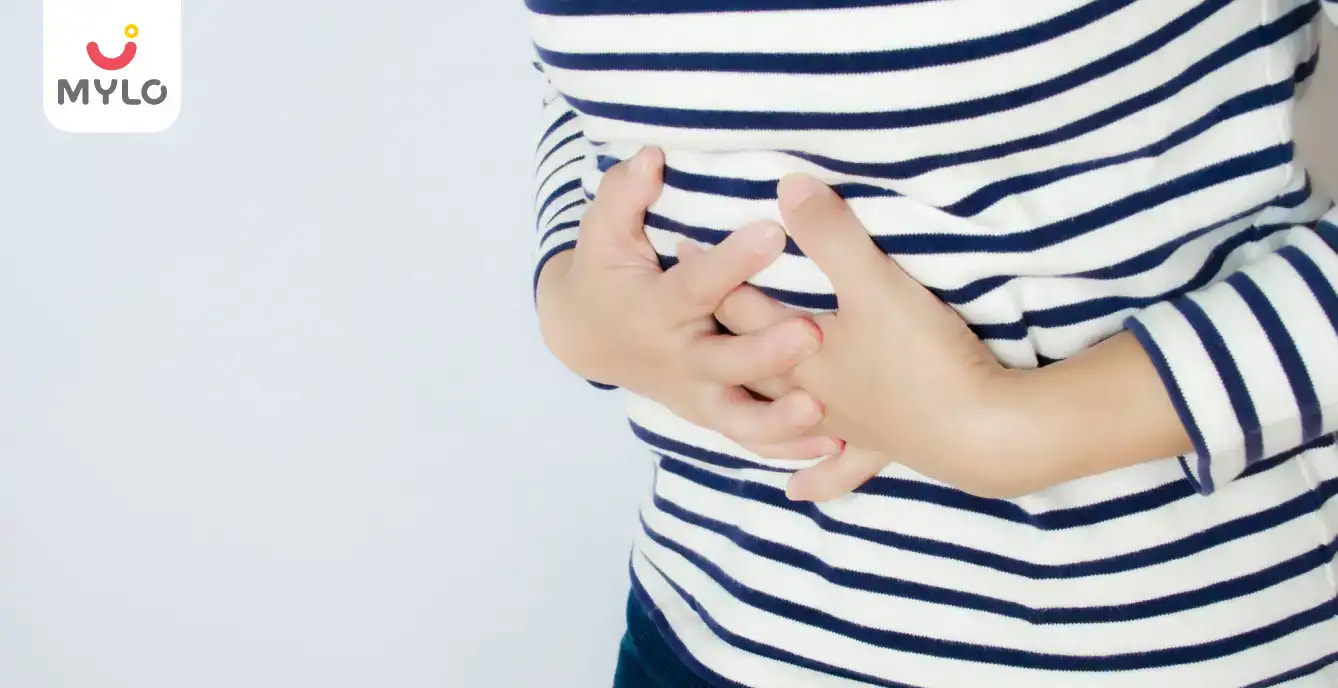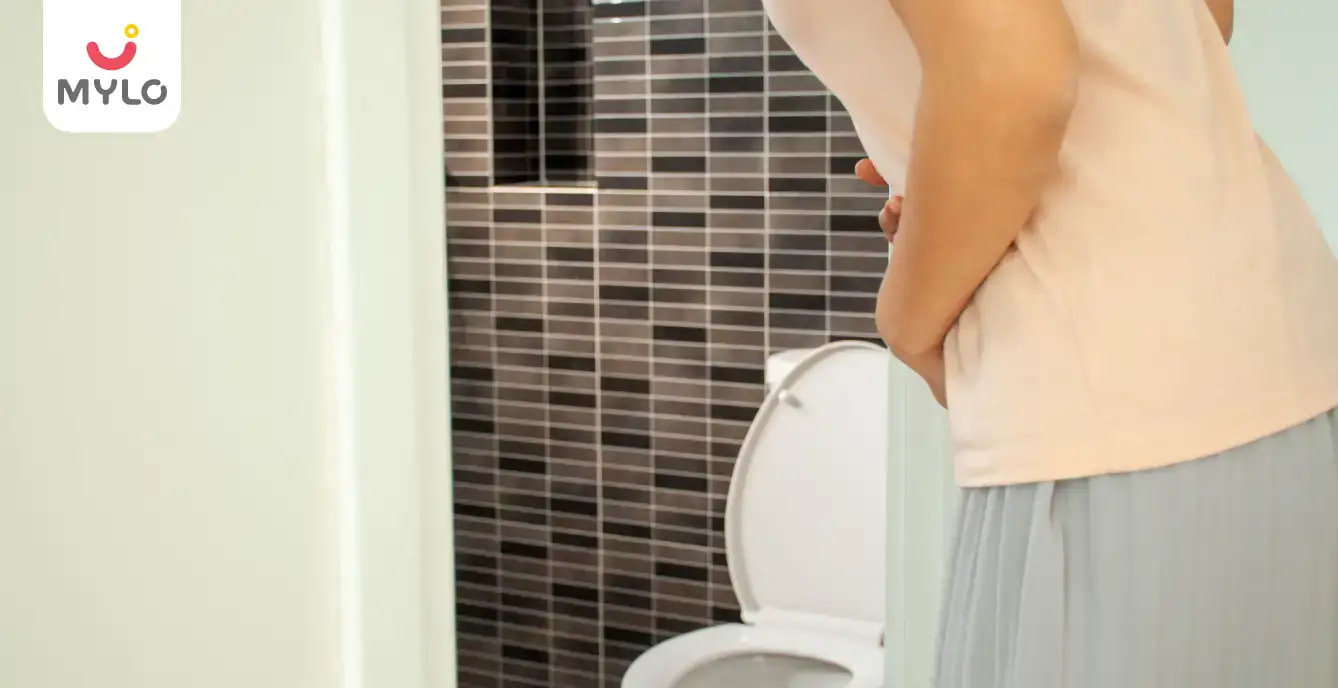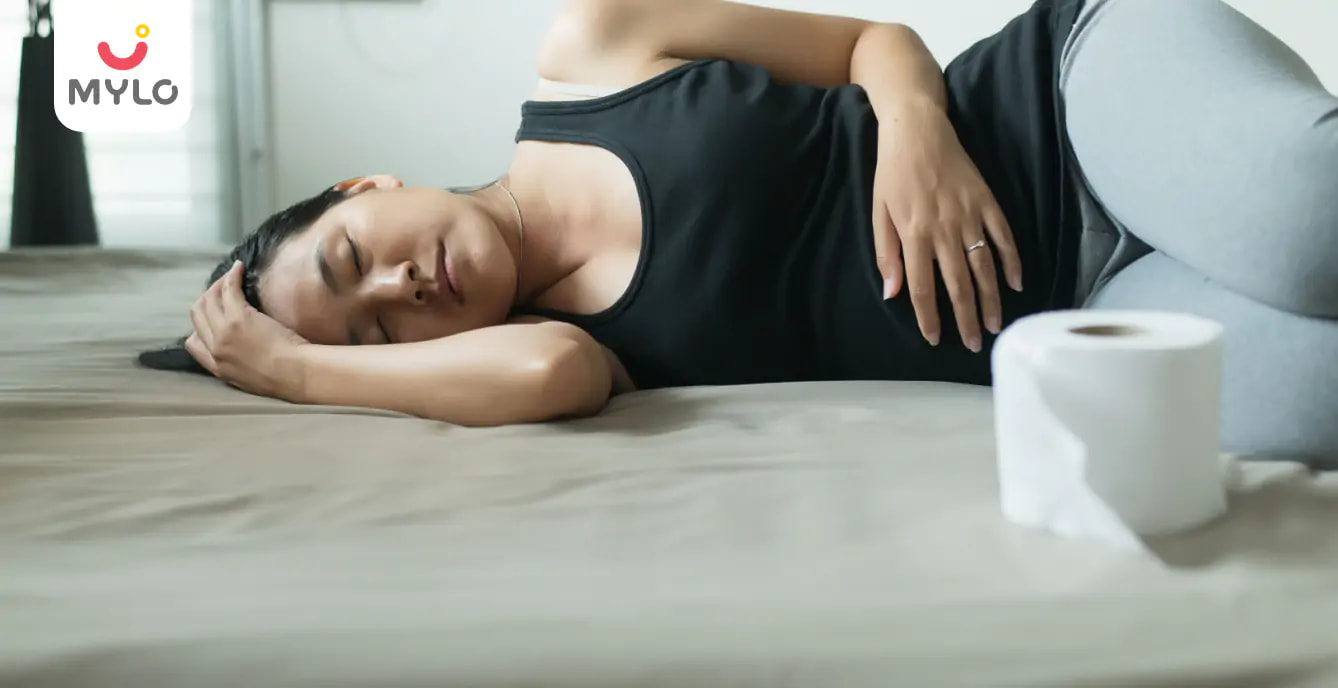Home

Early Pregnancy

Constipation in early pregnancy
In this Article

Early Pregnancy
Constipation in early pregnancy
Updated on 3 November 2023
The meaning of constipation is that one does not have clear, regular, and prompt bowel movements. It is because the wasted food no longer required by the body solidifies in the lower part of the digestive tract called the bowel instead of passing out as stool.
The hormones leading to pregnancy also lead to constipation which is not a pleasant condition. Sometimes women suffer from constipation in early pregnancy. It is a common problem seen during the period of pregnancy. Pregnancy constipation is the condition where a woman has fewer than three bowel movements in a week which is a bit troublesome.
The phenomenon of constipation is common during pregnancy. So for that purpose stool softeners like docusate sodium and docusate calcium help to loosen the stool making it easier to pass. It is a safe procedure that will not harm the developing baby because of the usage of safe ingredients. Sometimes a laxative is advised by the doctor. Some bulk-forming laxatives like psyllium and polycarbophil are considered safe to be used during pregnancy like saline laxatives called magnesium hydroxide or magnesium citrate, stimulants like bisacodyl, lactulose like cholac, and constilac.
When does constipation start in pregnancy?
The phenomenon of constipation initiates when the hormone levels in the body increase providing support to pregnancy. It is more visible in the second or third month of the first trimester of pregnancy.
Some lifestyle changes which can prevent the occurrence of pregnancy constipation are:-
-
A pregnant woman should drink a lot of fluids mostly water and some fruit juices.
-
A pregnant woman should include some physical activity in her routine. It will help to avoid constipation.
-
A pregnant woman should have more fiber in her diet. She should choose foods rich in fiber content like fruits, vegetables, whole grains, and beans in her diet. She can also choose a fiber supplement like Metamucil after consulting her doctor. She should take iron supplements after consulting the doctor as an excess of it leads to constipation during pregnancy.
Constipation in pregnancy: Is it a common phenomenon?
Around 39% of women get constipated during the phase of pregnancy. They are likely to face the issue in the third trimester when the fetus is heaviest which in turn puts the maximum pressure on the bowel. Sometimes constipation can happen in all three trimesters too and continue after the delivery of the baby.
Cause of constipation during pregnancy
The changes in hormones during pregnancy and daily habits increase the chances of constipation. Some of its causes are:-
-
Progesterone
The body produces more of the hormone called progesterone when one gets pregnant. This hormone relaxes the intestines or bowel so that they don't have to work hard to push out the stool from the body. This relaxation helps the body to absorb more nutrients and water from the food one eats. If the food item is in the bowel for long period the large intestine or colon has more time left to absorb it.
-
The fetus
The growing fetus makes the uterus heavy. This extra weight puts more pressure on the bowel which makes it harder for the waste product to clear out of the body.
-
The iron content of prenatal vitamins
The prenatal vitamins have iron which helps the body produce the blood required to circulate oxygen in the bodies of both the mother and the baby. But too much of this iron makes it tougher for the bacteria in the bowel to break down the food. And not hydrating enough by drinking water to loosen the bowel worsens the condition. This waste keeps on piling making one properly constipated.
-
Lifestyle issues
Being constipated also depends on one's eating habits or diet, the amount of fluid intake daily, and the level of exercise one does daily. If one doesn't follow these habits rightly they will end up with a lot of constipation and related issues.
What does constipation in early pregnancy feel like
A pregnant woman will know that she is constipated when:-
-
She gets to poop just a few times a week.
-
She has to apply pressure to poop while the stomach feels swollen with gas.
-
The stool is lumpy and hard when she poops and the passing of it gives her pain.
Pregnancy constipation: When to worry
Constipation during pregnancy can become more serious at times leading to hemorrhoids and anal fissures.
Diagnosis of constipation during pregnancy
The health care provider can diagnose constipation by knowing how much a woman poops and the appearance of her poop. Then he may ask her about her daily habits which maybe probably causing the issue or worsening it. He may ask what is her diet constituting and how much fluid intake she does daily, how much is she exercising and what medications and supplements is she taking.
How to relieve constipation during pregnancy immediately
Some of the ways to avoid the unpleasant condition of constipation during early pregnancy are:-
Eat fiber-rich foods daily
A pregnant woman should eat fiber-rich foods as they soften her stools making it easier for them to pass. Fibers are present in fruits, veggies, beans, lentils, and whole grains.
Drink more water daily
A pregnant woman should drink a minimum of 8 glasses of water daily to loosen the stool. One can also try juices, teas, smoothies, and low-fat milk but without added sugars.
Exercise moderately but daily
A pregnant woman should exercise in moderation as pregnancy puts strain on the pelvic area and joints that try to restrict easy movement. She can consult her doctor to tell her about exercises that will help to move the bowel in her stomach.
Change your prenatal vitamins
A pregnant woman may need to change the current prenatal vitamin which may be having too much iron for the digestive system to handle. The doctor can provide her with laxatives and fiber supplements if lifestyle changes don't prove effective. She should avoid home remedies like mineral or castor oils.
You may also like: https://mylofamily.com/article/top-10-ways-in-which-coconut-water-can-help-during-pregnancy-25464?
Conclusion
Constipation during pregnancy is not an uncommon thing if a pregnant woman does not follow a very healthy routine. She should eat right, drink a lot of fluids, do a lot of exercises and take the right medication to manage the issue effectively. By putting good habits in a place she can avoid unpleasant moments like having to strain herself to poop and focus on the good thing that she would give birth to a beautiful baby and celebrate blissful well-being.



Written by
Shaveta Gupta
An expert in content marketing, Shaveta is an alumnus of IIT, Bombay, she knows what the audience is looking for. Mother of a 6 year old, she has been instrumental in planning the content strategy at Mylo.
Read MoreGet baby's diet chart, and growth tips

Related Articles
RECENTLY PUBLISHED ARTICLES
our most recent articles

Diet & Nutrition
গর্ভাবস্থায় আলুবোখরা: উপকারিতা ও ঝুঁকি | Prunes During Pregnancy: Benefits & Risks in Bengali

Diet & Nutrition
গর্ভাবস্থায় হিং | ঝুঁকি, সুবিধা এবং অন্যান্য চিকিৎসা | Hing During Pregnancy | Risks, Benefits & Other Treatments in Bengali

Women Specific Issues
স্তনের উপর সাদা দাগ: লক্ষণ, কারণ এবং চিকিৎসা | White Spots on Nipple: Causes, Symptoms, and Treatments in Bengali

Diet & Nutrition
গর্ভাবস্থায় পোহা: উপকারিতা, ধরণ এবং রেসিপি | Poha During Pregnancy: Benefits, Types & Recipes in Bengali

Diet & Nutrition
গর্ভাবস্থায় মাছ: উপকারিতা এবং ঝুঁকি | Fish In Pregnancy: Benefits and Risks in Bengali

Diet & Nutrition
গর্ভাবস্থায় রেড ওয়াইন: পার্শ্ব প্রতিক্রিয়া এবং নির্দেশিকা | Red Wine During Pregnancy: Side Effects & Guidelines in Bengali
- ইনার থাই চ্যাফিং: কারণ, উপসর্গ এবং চিকিৎসা | Inner Thigh Chafing: Causes, Symptoms & Treatment in Bengali
- গর্ভাবস্থায় ব্রাউন রাইস: উপকারিতা ও সতর্কতা | Brown Rice During Pregnancy: Benefits & Precautions in Bengali
- Velamentous Cord Insertion - Precautions, Results & Safety
- Unlock the Secret to Flawless Skin: 7 Must-Have Qualities in a Face Serum
- Unlock the Secret to Radiant Skin: How Vitamin C Serum Can Transform Your Complexion
- Gender No Bar: 10 Reasons Why Everyone Needs a Body Lotion
- Unlock the Secret to Radiant Skin How to Choose the Perfect Body Lotion for Your Skin Type
- Top 10 Reasons to Apply a Body Lotion After Every Bath
- Communication in Toddlers: Milestones & Activities
- How to Improve Vocabulary for Toddlers?
- A Comprehensive Guide to Understanding Placenta Accreta
- Vulvovaginitis in Toddlers Causes, Symptoms and Treatment
- A Comprehensive Guide to Understanding Cerebral Palsy in Children
- Bitter Taste in Mouth During Pregnancy: Understanding the Causes and Remedies


AWARDS AND RECOGNITION

Mylo wins Forbes D2C Disruptor award

Mylo wins The Economic Times Promising Brands 2022
AS SEEN IN

- Mylo Care: Effective and science-backed personal care and wellness solutions for a joyful you.
- Mylo Baby: Science-backed, gentle and effective personal care & hygiene range for your little one.
- Mylo Community: Trusted and empathetic community of 10mn+ parents and experts.
Product Categories
baby carrier | baby soap | baby wipes | stretch marks cream | baby cream | baby shampoo | baby massage oil | baby hair oil | stretch marks oil | baby body wash | baby powder | baby lotion | diaper rash cream | newborn diapers | teether | baby kajal | baby diapers | cloth diapers |







